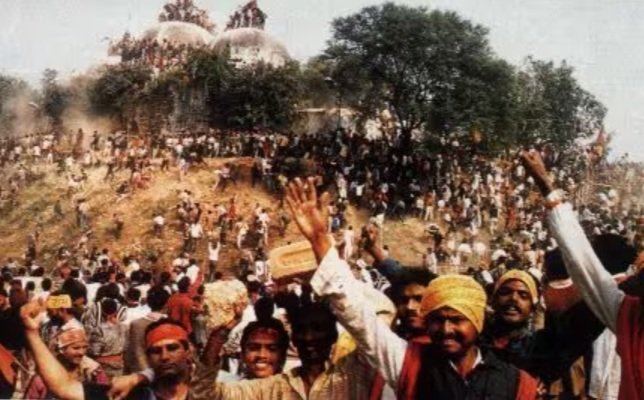Inside The Crisis Faced By Thousands Of Mosques In India
Photo via X
(ANALYSIS) Thirty-one years ago, a mob of almost 150,000 Hindu extremists descended on the Babri Masjid, a 500-year old mosque in India’s Ayodhya city. Leading The mob were politicians from the ruling Bharatiya Janata Party, who rallied members of notorious Hindu nationalist paramilitary groups to participate in the violence and later replace the mosque with a Hindu temple.
The mosque, these groups claimed, was built on the precise spot where the Hindu deity Ram was born. Armed with hammers and tridents, the mob destroyed the mosque within a day, triggering an outbreak of nationwide anti-Muslim violence that led to the killings of over 2,000 people and the demolition of scores of more mosques, homes, and businesses.
Today, the Babri Mosque demolition remains a lightning rod issue in India. To the Hindu right, the destruction of the Babri Mosque and its replacement with a temple was a victory for Hindutva, an increasingly mainstream supremacist ideology that seeks to violently erase religious minorities — their history, their beliefs, their lives — in order to claim India for Hindus.
READ: Rape And Sexual Violence In The Indian State Of Manipur
To Muslims, who have become the main target of Hindutva’s genocidal project, the Babri Mosque’s demolition is an evergreen threat. Hindu nationalist politicians frequently flaunt their destruction of the Mosque as evidence of Muslim’s powerlessness in India. Their message is this: We can always destroy more mosques and spark more anti-Muslim violence, whenever we want, which they continue to do with startling regularity. In this vein, the BJP and its supporters among the Hindu far-right have strategically exploited the Babri Mosque's demolition to maintain electoral power and instill fear among Muslims.
Just as Hindu militant groups in 1992 claimed that the Babri Mosque was built on the birthplace of Ram, militant groups and BJP politicians today have popularized the wildly ahistorical claim that all of India’s Mughal-era mosques were built on the foundations of “razed temples.” Using this logic, which demonizes Muslims both past and present, far-right Hindu groups are threatening thousands of mosques throughout India with demolition.
From Uttar Pradesh in the north to Karnataka in the south, the M.O. is largely the same: Hindu nationalists claim that a mosque or Muslim structure was once a temple, demand archeological surveys to build “evidence”, and wage campaigns in the courts to demand the structure be handed over to Hindus and be converted into temples.
In Uttar Pradesh state’s Mathura city, another historic mosque, 350-year-old Shahi Idgah, is routinely threatened with destruction by Hindu groups: At least nine petitions have been filed in local courts calling for its demolition, claiming it was built over the exact birthplace of the deity Krishna.
Militant groups have also threatened to break into the mosque, purify it with Hindu rituals, and place an idol inside. One extremist leader declared that Uttar Pradesh’s Hindu supremacist Chief Minister, Yogi Adityanath, would shower the militants with “flowers, not sticks and bullets” should they demolish the mosque. East of Mathura, in the city of Varanasi, Hindu supremacists have weaponized the courts to get the ablution fountain in the courtyard of Gyanvapi Mosque sealed off from Muslims, claiming that the structure is actually an abstract representation of the deity Shiva and should be reserved for Hindu worship.
These are only the most prominent examples; a list of demolition targets prepared by the extremist group Hindu Mahasabha includes at least 880 mosques, shrines, cemeteries, congregation halls, and other Muslim places of worship. Many such places of worship have already been demolished by BJP state governments or Hindu militant vigilantes, claiming such structures are “illegal” and “encroachments.”
Videos of chanting Hindu militants destroying Muslim shrines routinely surface out of Uttarakhand state. Two historic mosques, the 16th century-era Shahi Masjidand 60-year-old Masjid Gareeb Nawaz Al Maroof, have been bulldozed by the Uttar Pradesh government as part of road widening projects, citing the “illegality” of both structures.
In the Indian capital of New Delhi, it has become common for city authorities to deploy bulldozers against local Muslim shrines and graves of Sufi saints with little warning. One Delhi mosque was partially demolished with no warning at all, destroying the living quarters of 21 children from underprivileged backgrounds who attended the mosque’s seminary.
The Hindu right's goal is quite evident: the annihilation of mosques, and with them, the foundational pillar of Islamic faith in India. The fallacy of widespread temple destruction during Mughal rule serves as a historical fabrication justifying the escalating violence against Indian Muslims, who already endure frequent mob assaults, lynchings, attacks on their homes and neighborhoods, revocation of citizenship rights, prohibitions on religious attire and public prayers, and calls for genocide.
And these attacks pose a profound threat not only to the religious sanctity of these places, but also to the secular fabric and democracy of India as a whole.
Running now through Dec. 31, NewsMatch will match your donations up to $1,000. Your generosity will help keep Religion Unplugged going in 2024 and beyond. You can donate here.
Safa Ahmed is the associate director of media and communications for the Indian American Muslim Council.

